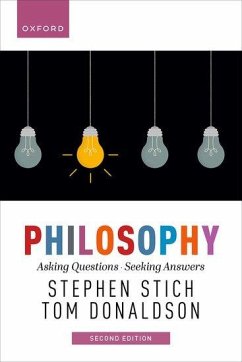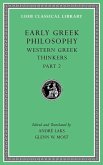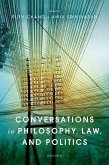Stephen Stich (Rutgers University ), Donaldson, Thomas, PHD (Simon Fraser University )
Philosophy, 2e
Asking Questions, Seeking Answers
Stephen Stich (Rutgers University ), Donaldson, Thomas, PHD (Simon Fraser University )
Philosophy, 2e
Asking Questions, Seeking Answers
- Broschiertes Buch
- Merkliste
- Auf die Merkliste
- Bewerten Bewerten
- Teilen
- Produkt teilen
- Produkterinnerung
- Produkterinnerung
An exceptionally clear, compact, and affordable guide to the fundamental questions-and answers-of Philosophy.
Andere Kunden interessierten sich auch für
![The Sacred Tradition of Yoga: Philosophy, Ethics, and Practices for a Modern Spiritual Life The Sacred Tradition of Yoga: Philosophy, Ethics, and Practices for a Modern Spiritual Life]() Dr. Shankaranarayana JoisThe Sacred Tradition of Yoga: Philosophy, Ethics, and Practices for a Modern Spiritual Life30,99 €
Dr. Shankaranarayana JoisThe Sacred Tradition of Yoga: Philosophy, Ethics, and Practices for a Modern Spiritual Life30,99 €![A Short History of African Philosophy, Second Edition A Short History of African Philosophy, Second Edition]() Barry HallenA Short History of African Philosophy, Second Edition27,99 €
Barry HallenA Short History of African Philosophy, Second Edition27,99 €![Early Greek Philosophy, Volume V Early Greek Philosophy, Volume V]() Early Greek Philosophy, Volume V35,99 €
Early Greek Philosophy, Volume V35,99 €![Conversations in Philosophy, Law, and Politics Conversations in Philosophy, Law, and Politics]() Conversations in Philosophy, Law, and Politics42,99 €
Conversations in Philosophy, Law, and Politics42,99 €![Science after the Practice Turn in the Philosophy, History, and Social Studies of Science Science after the Practice Turn in the Philosophy, History, and Social Studies of Science]() Science after the Practice Turn in the Philosophy, History, and Social Studies of Science42,99 €
Science after the Practice Turn in the Philosophy, History, and Social Studies of Science42,99 €![Philosophy, Rights and Natural Law Philosophy, Rights and Natural Law]() Philosophy, Rights and Natural Law33,99 €
Philosophy, Rights and Natural Law33,99 €![The Truth Of Thought, Or, Material Logic: A Short Treatise On The Initial Philosophy, The Groundwork Necessary For The Consistent Pursuit Of Knowledge The Truth Of Thought, Or, Material Logic: A Short Treatise On The Initial Philosophy, The Groundwork Necessary For The Consistent Pursuit Of Knowledge]() William 1848-1923 PolandThe Truth Of Thought, Or, Material Logic: A Short Treatise On The Initial Philosophy, The Groundwork Necessary For The Consistent Pursuit Of Knowledge24,99 €
William 1848-1923 PolandThe Truth Of Thought, Or, Material Logic: A Short Treatise On The Initial Philosophy, The Groundwork Necessary For The Consistent Pursuit Of Knowledge24,99 €-
-
-
An exceptionally clear, compact, and affordable guide to the fundamental questions-and answers-of Philosophy.
Hinweis: Dieser Artikel kann nur an eine deutsche Lieferadresse ausgeliefert werden.
Hinweis: Dieser Artikel kann nur an eine deutsche Lieferadresse ausgeliefert werden.
Produktdetails
- Produktdetails
- Verlag: Oxford University Press Inc
- 2 Revised edition
- Seitenzahl: 456
- Erscheinungstermin: 17. Oktober 2024
- Englisch
- Abmessung: 209mm x 141mm x 25mm
- Gewicht: 524g
- ISBN-13: 9780197768013
- ISBN-10: 0197768016
- Artikelnr.: 70440042
- Herstellerkennzeichnung
- Libri GmbH
- Europaallee 1
- 36244 Bad Hersfeld
- 06621 890
- Verlag: Oxford University Press Inc
- 2 Revised edition
- Seitenzahl: 456
- Erscheinungstermin: 17. Oktober 2024
- Englisch
- Abmessung: 209mm x 141mm x 25mm
- Gewicht: 524g
- ISBN-13: 9780197768013
- ISBN-10: 0197768016
- Artikelnr.: 70440042
- Herstellerkennzeichnung
- Libri GmbH
- Europaallee 1
- 36244 Bad Hersfeld
- 06621 890
Stephen Stich is Professor of Philosophy at Rutgers University and an Honorary Professor at the University of Sheffield. He is known for his contributions to philosophy of mind. He is the author of Mindreading (OUP, 2003), Deconstructing the Mind (OUP, 1996), The Fragmentation of Reason (MIT Press, 1990), From Folk Psychology to Cognitive Science (MIT Press, 1983), and many others. Thomas Donaldson is Assistant Professor of Philosophy at Simon Fraser University. He holds a PhD in Philosophy from Rutgers University and wrote his dissertation on American Pragmatism. While receiving his MMathPhil (1st class) in Mathematics and Philosophy at Oxford University, he was awarded the Henry Wilde Prize, Elizabeth Anscombe Prize, and the Gibbs Prize. His areas of expertise are Philosophy of Logic and Language, Metaphysics, and American Pragmatism.
* Preface?
* CHAPTER 1 What Is Philosophy?
* 1.1 Philosophy Is Everywhere
* 1.2 What Is a Philosophical Question?
* 1.3 The Philosophical Method
* 1.4 Philosophy and Science
* 1.5 Why Bother?
* Discussion Question
* Notes
* CHAPTER 2 What Are Arguments, and How Should We Evaluate Them?
* Introduction
* 2.1 Premises and Conclusions
* 2.2 Evaluating Arguments
* 2.3 Deductive Validity
* 2.4 Induction and Abduction
* 2.5 Multistep Arguments
* 2.6 Evaluating Multistep Arguments
* 2.7 Some Arguments to Evaluate
* 2.8 Answers to Problems
* What to Look at Next
* Glossary
* Notes
* CHAPTER 3 Does God Exist?
* Introduction
* 3.1 The First Cause Argument
* 3.2 Some Questions about the First Cause Argument
* 3.3 Leibniz's Cosmological Argument
* 3.4 The Design Argument
* 3.5 Criticisms of the Design Argument
* 3.6 Anselm's Ontological Argument
* 3.7 What, If Anything, Is Wrong with Anselm's Ontological Argument?
* 3.8 A Pragmatic Case for Theism?
* Conclusion
* Glossary
* Comprehension Questions
* Discussion Questions
* What to Look at Next
* Notes
* CHAPTER 4 Why Does God Leave Us to Suffer?
* Introduction
* 4.1 Three Logical Puzzles for Theists
* 4.2 Introducing the Problem of Evil
* 4.3 Three Inadequate Responses
* 4.4 Rethinking the Nature of God
* 4.5 Theodicy
* 4.6 Skeptical Theism
* Conclusion
* Glossary
* Comprehension Questions
* Discussion Questions
* What to Look at Next
* Notes
* CHAPTER 5 Can We Be Completely Certain of Anything?
* Introduction
* 5.1 Descartes's Project
* 5.2 Certainty Is Hard to Find
* 5.3 Achieving Certainty
* 5.4 Clear and Distinct Perception
* 5.5 Descartes's Theism, and His Solution to the Evil Demon Problem
* 5.6 The Cartesian Circle
* 5.7 Descartes's Legacy
* Conclusion
* Glossary
* Comprehension Questions
* Discussion Questions
* What to Look at Next
* Notes
* CHAPTER 6 Can We Trust Our Senses?
* 6.1 Rationalism and Empiricism
* 6.2 Indirect Realism
* 6.3 Primary and Secondary Qualities
* 6.4 Do Material Objects Really Exist?
* 6.5 Berkeley's Idealism
* 6.6 Direct Realism
* Conclusion
* Glossary
* Comprehension Questions
* Discussion Questions
* What to Look at Next
* Notes
* CHAPTER 7 Will the Sun Rise Tomorrow?
* Introduction
* 7.1 Making Predictions
* 7.2 Hume's Problem
* 7.3 Karl Popper
* 7.4 Peter Strawson
* 7.5 Epistemically Basic Beliefs
* 7.6 Beyond Enumerative Induction
* Glossary
* Comprehension Questions
* Discussion Questions
* What to Look at Next
* Notes
* CHAPTER 8 What Is Knowledge?
* Introduction
* 8.1 Three Kinds of Knowledge
* 8.2 Analyzing Propositional Knowledge: The Easy Part-Belief and Truth
* 8.3 Analyzing Propositional Knowledge: The Hard Part-Justification
* 8.4 Foundationalism
* 8.5 Coherentism
* 8.6 Internalism and Externalism
* 8.7 Fallibilism and Skepticism
* 8.8 Gettier Cases-A Challenge to the Justified True Belief Account of
Knowledge
* Glossary
* Comprehension Questions
* Discussion Questions
* What to Look at Next
* Notes
* CHAPTER 9 Do We Have Free Will?
* 9.1 What Is Determinism?
* 9.2 Incompatibilism
* 9.3 Compatibilism
* 9.4 Libertarianism
* Glossary
* Comprehension Questions
* Discussion Questions
* What to Look at Next
* Notes
* CHAPTER 10 Race
* Introduction
* 10.1 Racialism XX
* 10.2 Non-Racialist Meanings of 'Race'
* Summary XX
* Glossary
* Comprehension Questions
* Discussion Questions
* What to Look at Next
* Notes
* CHAPTER 11 How Is Your Mind Related to Your Body?
* Introduction
* 11.1 Cartesian Dualism
* 11.2 Philosophical Behaviorism
* 11.3 The Mind-Brain Identity Theory
* 11.4 Functionalism
* 11.5 Physicalism, Zombies and a Revival of Dualism
* Glossary
* Comprehension Questions
* Discussion Questions
* What to Look at Next
* Notes
* CHAPTER 12 Will You Be the Same Person in Ten Years? Could You
Survive Death?
* 12.1 The Philosophical Issue and Its Practical Importance
* 12.2 The Soul Theory
* 12.3 Problems for Soul Theory
* 12.4 Memory Theories
* 12.5 Personal Identity and the Brain
* Glossary
* Comprehension Questions
* Discussion Questions
* What to Look at Next
* Notes
* CHAPTER 13 Are There Objective Truths about Right and Wrong?
* Introduction
* 13.1 Objective Truth
* 13.2 The Divine Command Theory
* 13.3 Cultural Relativism
* 13.4 Subjectivism and Expressivism
* 13.5 The Qualified Attitude Theory
* Conclusion
* Glossary
* Comprehension Questions
* Discussion Questions
* What to Look at Next
* Notes
* CHAPTER 14 What Really Matters?
* Introduction
* 14.1 Hedonism
* 14.2 Sartre
* 14.3 Susan Wolf on Meaningfulness
* Conclusion
* Glossary
* Comprehension Questions
* Discussion Questions
* What to Look at Next
* Notes
* CHAPTER 15 What Should We Do? (Part I)
* 15.1 Act Consequentialism and Act Utilitarianism
* 15.2 Objections to Act Utilitarianism
* 15.3 Rule Consequentialism and Rule Utilitarianism
* 15.4 Kant's Universalization Test
* 15.5 Kant's Humanity Formula
* 15.6 Comparing Kantianism and Consequentialism
* Glossary
* Comprehension Questions
* Discussion Questions
* What to Look at Next
* Notes
* CHAPTER 16 What Should We Do? (Part II)
* Introduction
* 16.1 Is It Morally Wrong to Go to the Opera While People Are
Starving?
* 16.2 Vegetarianism
* 16.3 Is Abortion Morally Wrong?
* Glossary
* Comprehension Questions
* Discussion Questions
* What to Look at Next
* Notes
* CHAPTER 17 Why Democracy?
* 17.1 What is Democracy?
* 17.2 The Basic Argument Against Democracy
* 17.3 A Modest Defence of Democracy
* 17.4 Are Democratic Countries Well Run?
* 17.5 Non-Instrumental Defenses of Democracy
* Conclusion
* Glossary
* Comprehension Questions
* Discussion Questions
* What to Look at Next
* Appendix: A General Knowledge Quiz
* Appendix A: Reading and Writing Tips
* Seven Tips on Reading Philosophy
* Eighteen Tips for Writing Philosophy Papers
* Appendix B: The Truth about Philosophy Majors
* Careers
* Salaries
* Meaning
* Resources
* Notes
* Glossary
* Credits
* Index
* CHAPTER 1 What Is Philosophy?
* 1.1 Philosophy Is Everywhere
* 1.2 What Is a Philosophical Question?
* 1.3 The Philosophical Method
* 1.4 Philosophy and Science
* 1.5 Why Bother?
* Discussion Question
* Notes
* CHAPTER 2 What Are Arguments, and How Should We Evaluate Them?
* Introduction
* 2.1 Premises and Conclusions
* 2.2 Evaluating Arguments
* 2.3 Deductive Validity
* 2.4 Induction and Abduction
* 2.5 Multistep Arguments
* 2.6 Evaluating Multistep Arguments
* 2.7 Some Arguments to Evaluate
* 2.8 Answers to Problems
* What to Look at Next
* Glossary
* Notes
* CHAPTER 3 Does God Exist?
* Introduction
* 3.1 The First Cause Argument
* 3.2 Some Questions about the First Cause Argument
* 3.3 Leibniz's Cosmological Argument
* 3.4 The Design Argument
* 3.5 Criticisms of the Design Argument
* 3.6 Anselm's Ontological Argument
* 3.7 What, If Anything, Is Wrong with Anselm's Ontological Argument?
* 3.8 A Pragmatic Case for Theism?
* Conclusion
* Glossary
* Comprehension Questions
* Discussion Questions
* What to Look at Next
* Notes
* CHAPTER 4 Why Does God Leave Us to Suffer?
* Introduction
* 4.1 Three Logical Puzzles for Theists
* 4.2 Introducing the Problem of Evil
* 4.3 Three Inadequate Responses
* 4.4 Rethinking the Nature of God
* 4.5 Theodicy
* 4.6 Skeptical Theism
* Conclusion
* Glossary
* Comprehension Questions
* Discussion Questions
* What to Look at Next
* Notes
* CHAPTER 5 Can We Be Completely Certain of Anything?
* Introduction
* 5.1 Descartes's Project
* 5.2 Certainty Is Hard to Find
* 5.3 Achieving Certainty
* 5.4 Clear and Distinct Perception
* 5.5 Descartes's Theism, and His Solution to the Evil Demon Problem
* 5.6 The Cartesian Circle
* 5.7 Descartes's Legacy
* Conclusion
* Glossary
* Comprehension Questions
* Discussion Questions
* What to Look at Next
* Notes
* CHAPTER 6 Can We Trust Our Senses?
* 6.1 Rationalism and Empiricism
* 6.2 Indirect Realism
* 6.3 Primary and Secondary Qualities
* 6.4 Do Material Objects Really Exist?
* 6.5 Berkeley's Idealism
* 6.6 Direct Realism
* Conclusion
* Glossary
* Comprehension Questions
* Discussion Questions
* What to Look at Next
* Notes
* CHAPTER 7 Will the Sun Rise Tomorrow?
* Introduction
* 7.1 Making Predictions
* 7.2 Hume's Problem
* 7.3 Karl Popper
* 7.4 Peter Strawson
* 7.5 Epistemically Basic Beliefs
* 7.6 Beyond Enumerative Induction
* Glossary
* Comprehension Questions
* Discussion Questions
* What to Look at Next
* Notes
* CHAPTER 8 What Is Knowledge?
* Introduction
* 8.1 Three Kinds of Knowledge
* 8.2 Analyzing Propositional Knowledge: The Easy Part-Belief and Truth
* 8.3 Analyzing Propositional Knowledge: The Hard Part-Justification
* 8.4 Foundationalism
* 8.5 Coherentism
* 8.6 Internalism and Externalism
* 8.7 Fallibilism and Skepticism
* 8.8 Gettier Cases-A Challenge to the Justified True Belief Account of
Knowledge
* Glossary
* Comprehension Questions
* Discussion Questions
* What to Look at Next
* Notes
* CHAPTER 9 Do We Have Free Will?
* 9.1 What Is Determinism?
* 9.2 Incompatibilism
* 9.3 Compatibilism
* 9.4 Libertarianism
* Glossary
* Comprehension Questions
* Discussion Questions
* What to Look at Next
* Notes
* CHAPTER 10 Race
* Introduction
* 10.1 Racialism XX
* 10.2 Non-Racialist Meanings of 'Race'
* Summary XX
* Glossary
* Comprehension Questions
* Discussion Questions
* What to Look at Next
* Notes
* CHAPTER 11 How Is Your Mind Related to Your Body?
* Introduction
* 11.1 Cartesian Dualism
* 11.2 Philosophical Behaviorism
* 11.3 The Mind-Brain Identity Theory
* 11.4 Functionalism
* 11.5 Physicalism, Zombies and a Revival of Dualism
* Glossary
* Comprehension Questions
* Discussion Questions
* What to Look at Next
* Notes
* CHAPTER 12 Will You Be the Same Person in Ten Years? Could You
Survive Death?
* 12.1 The Philosophical Issue and Its Practical Importance
* 12.2 The Soul Theory
* 12.3 Problems for Soul Theory
* 12.4 Memory Theories
* 12.5 Personal Identity and the Brain
* Glossary
* Comprehension Questions
* Discussion Questions
* What to Look at Next
* Notes
* CHAPTER 13 Are There Objective Truths about Right and Wrong?
* Introduction
* 13.1 Objective Truth
* 13.2 The Divine Command Theory
* 13.3 Cultural Relativism
* 13.4 Subjectivism and Expressivism
* 13.5 The Qualified Attitude Theory
* Conclusion
* Glossary
* Comprehension Questions
* Discussion Questions
* What to Look at Next
* Notes
* CHAPTER 14 What Really Matters?
* Introduction
* 14.1 Hedonism
* 14.2 Sartre
* 14.3 Susan Wolf on Meaningfulness
* Conclusion
* Glossary
* Comprehension Questions
* Discussion Questions
* What to Look at Next
* Notes
* CHAPTER 15 What Should We Do? (Part I)
* 15.1 Act Consequentialism and Act Utilitarianism
* 15.2 Objections to Act Utilitarianism
* 15.3 Rule Consequentialism and Rule Utilitarianism
* 15.4 Kant's Universalization Test
* 15.5 Kant's Humanity Formula
* 15.6 Comparing Kantianism and Consequentialism
* Glossary
* Comprehension Questions
* Discussion Questions
* What to Look at Next
* Notes
* CHAPTER 16 What Should We Do? (Part II)
* Introduction
* 16.1 Is It Morally Wrong to Go to the Opera While People Are
Starving?
* 16.2 Vegetarianism
* 16.3 Is Abortion Morally Wrong?
* Glossary
* Comprehension Questions
* Discussion Questions
* What to Look at Next
* Notes
* CHAPTER 17 Why Democracy?
* 17.1 What is Democracy?
* 17.2 The Basic Argument Against Democracy
* 17.3 A Modest Defence of Democracy
* 17.4 Are Democratic Countries Well Run?
* 17.5 Non-Instrumental Defenses of Democracy
* Conclusion
* Glossary
* Comprehension Questions
* Discussion Questions
* What to Look at Next
* Appendix: A General Knowledge Quiz
* Appendix A: Reading and Writing Tips
* Seven Tips on Reading Philosophy
* Eighteen Tips for Writing Philosophy Papers
* Appendix B: The Truth about Philosophy Majors
* Careers
* Salaries
* Meaning
* Resources
* Notes
* Glossary
* Credits
* Index
* Preface?
* CHAPTER 1 What Is Philosophy?
* 1.1 Philosophy Is Everywhere
* 1.2 What Is a Philosophical Question?
* 1.3 The Philosophical Method
* 1.4 Philosophy and Science
* 1.5 Why Bother?
* Discussion Question
* Notes
* CHAPTER 2 What Are Arguments, and How Should We Evaluate Them?
* Introduction
* 2.1 Premises and Conclusions
* 2.2 Evaluating Arguments
* 2.3 Deductive Validity
* 2.4 Induction and Abduction
* 2.5 Multistep Arguments
* 2.6 Evaluating Multistep Arguments
* 2.7 Some Arguments to Evaluate
* 2.8 Answers to Problems
* What to Look at Next
* Glossary
* Notes
* CHAPTER 3 Does God Exist?
* Introduction
* 3.1 The First Cause Argument
* 3.2 Some Questions about the First Cause Argument
* 3.3 Leibniz's Cosmological Argument
* 3.4 The Design Argument
* 3.5 Criticisms of the Design Argument
* 3.6 Anselm's Ontological Argument
* 3.7 What, If Anything, Is Wrong with Anselm's Ontological Argument?
* 3.8 A Pragmatic Case for Theism?
* Conclusion
* Glossary
* Comprehension Questions
* Discussion Questions
* What to Look at Next
* Notes
* CHAPTER 4 Why Does God Leave Us to Suffer?
* Introduction
* 4.1 Three Logical Puzzles for Theists
* 4.2 Introducing the Problem of Evil
* 4.3 Three Inadequate Responses
* 4.4 Rethinking the Nature of God
* 4.5 Theodicy
* 4.6 Skeptical Theism
* Conclusion
* Glossary
* Comprehension Questions
* Discussion Questions
* What to Look at Next
* Notes
* CHAPTER 5 Can We Be Completely Certain of Anything?
* Introduction
* 5.1 Descartes's Project
* 5.2 Certainty Is Hard to Find
* 5.3 Achieving Certainty
* 5.4 Clear and Distinct Perception
* 5.5 Descartes's Theism, and His Solution to the Evil Demon Problem
* 5.6 The Cartesian Circle
* 5.7 Descartes's Legacy
* Conclusion
* Glossary
* Comprehension Questions
* Discussion Questions
* What to Look at Next
* Notes
* CHAPTER 6 Can We Trust Our Senses?
* 6.1 Rationalism and Empiricism
* 6.2 Indirect Realism
* 6.3 Primary and Secondary Qualities
* 6.4 Do Material Objects Really Exist?
* 6.5 Berkeley's Idealism
* 6.6 Direct Realism
* Conclusion
* Glossary
* Comprehension Questions
* Discussion Questions
* What to Look at Next
* Notes
* CHAPTER 7 Will the Sun Rise Tomorrow?
* Introduction
* 7.1 Making Predictions
* 7.2 Hume's Problem
* 7.3 Karl Popper
* 7.4 Peter Strawson
* 7.5 Epistemically Basic Beliefs
* 7.6 Beyond Enumerative Induction
* Glossary
* Comprehension Questions
* Discussion Questions
* What to Look at Next
* Notes
* CHAPTER 8 What Is Knowledge?
* Introduction
* 8.1 Three Kinds of Knowledge
* 8.2 Analyzing Propositional Knowledge: The Easy Part-Belief and Truth
* 8.3 Analyzing Propositional Knowledge: The Hard Part-Justification
* 8.4 Foundationalism
* 8.5 Coherentism
* 8.6 Internalism and Externalism
* 8.7 Fallibilism and Skepticism
* 8.8 Gettier Cases-A Challenge to the Justified True Belief Account of
Knowledge
* Glossary
* Comprehension Questions
* Discussion Questions
* What to Look at Next
* Notes
* CHAPTER 9 Do We Have Free Will?
* 9.1 What Is Determinism?
* 9.2 Incompatibilism
* 9.3 Compatibilism
* 9.4 Libertarianism
* Glossary
* Comprehension Questions
* Discussion Questions
* What to Look at Next
* Notes
* CHAPTER 10 Race
* Introduction
* 10.1 Racialism XX
* 10.2 Non-Racialist Meanings of 'Race'
* Summary XX
* Glossary
* Comprehension Questions
* Discussion Questions
* What to Look at Next
* Notes
* CHAPTER 11 How Is Your Mind Related to Your Body?
* Introduction
* 11.1 Cartesian Dualism
* 11.2 Philosophical Behaviorism
* 11.3 The Mind-Brain Identity Theory
* 11.4 Functionalism
* 11.5 Physicalism, Zombies and a Revival of Dualism
* Glossary
* Comprehension Questions
* Discussion Questions
* What to Look at Next
* Notes
* CHAPTER 12 Will You Be the Same Person in Ten Years? Could You
Survive Death?
* 12.1 The Philosophical Issue and Its Practical Importance
* 12.2 The Soul Theory
* 12.3 Problems for Soul Theory
* 12.4 Memory Theories
* 12.5 Personal Identity and the Brain
* Glossary
* Comprehension Questions
* Discussion Questions
* What to Look at Next
* Notes
* CHAPTER 13 Are There Objective Truths about Right and Wrong?
* Introduction
* 13.1 Objective Truth
* 13.2 The Divine Command Theory
* 13.3 Cultural Relativism
* 13.4 Subjectivism and Expressivism
* 13.5 The Qualified Attitude Theory
* Conclusion
* Glossary
* Comprehension Questions
* Discussion Questions
* What to Look at Next
* Notes
* CHAPTER 14 What Really Matters?
* Introduction
* 14.1 Hedonism
* 14.2 Sartre
* 14.3 Susan Wolf on Meaningfulness
* Conclusion
* Glossary
* Comprehension Questions
* Discussion Questions
* What to Look at Next
* Notes
* CHAPTER 15 What Should We Do? (Part I)
* 15.1 Act Consequentialism and Act Utilitarianism
* 15.2 Objections to Act Utilitarianism
* 15.3 Rule Consequentialism and Rule Utilitarianism
* 15.4 Kant's Universalization Test
* 15.5 Kant's Humanity Formula
* 15.6 Comparing Kantianism and Consequentialism
* Glossary
* Comprehension Questions
* Discussion Questions
* What to Look at Next
* Notes
* CHAPTER 16 What Should We Do? (Part II)
* Introduction
* 16.1 Is It Morally Wrong to Go to the Opera While People Are
Starving?
* 16.2 Vegetarianism
* 16.3 Is Abortion Morally Wrong?
* Glossary
* Comprehension Questions
* Discussion Questions
* What to Look at Next
* Notes
* CHAPTER 17 Why Democracy?
* 17.1 What is Democracy?
* 17.2 The Basic Argument Against Democracy
* 17.3 A Modest Defence of Democracy
* 17.4 Are Democratic Countries Well Run?
* 17.5 Non-Instrumental Defenses of Democracy
* Conclusion
* Glossary
* Comprehension Questions
* Discussion Questions
* What to Look at Next
* Appendix: A General Knowledge Quiz
* Appendix A: Reading and Writing Tips
* Seven Tips on Reading Philosophy
* Eighteen Tips for Writing Philosophy Papers
* Appendix B: The Truth about Philosophy Majors
* Careers
* Salaries
* Meaning
* Resources
* Notes
* Glossary
* Credits
* Index
* CHAPTER 1 What Is Philosophy?
* 1.1 Philosophy Is Everywhere
* 1.2 What Is a Philosophical Question?
* 1.3 The Philosophical Method
* 1.4 Philosophy and Science
* 1.5 Why Bother?
* Discussion Question
* Notes
* CHAPTER 2 What Are Arguments, and How Should We Evaluate Them?
* Introduction
* 2.1 Premises and Conclusions
* 2.2 Evaluating Arguments
* 2.3 Deductive Validity
* 2.4 Induction and Abduction
* 2.5 Multistep Arguments
* 2.6 Evaluating Multistep Arguments
* 2.7 Some Arguments to Evaluate
* 2.8 Answers to Problems
* What to Look at Next
* Glossary
* Notes
* CHAPTER 3 Does God Exist?
* Introduction
* 3.1 The First Cause Argument
* 3.2 Some Questions about the First Cause Argument
* 3.3 Leibniz's Cosmological Argument
* 3.4 The Design Argument
* 3.5 Criticisms of the Design Argument
* 3.6 Anselm's Ontological Argument
* 3.7 What, If Anything, Is Wrong with Anselm's Ontological Argument?
* 3.8 A Pragmatic Case for Theism?
* Conclusion
* Glossary
* Comprehension Questions
* Discussion Questions
* What to Look at Next
* Notes
* CHAPTER 4 Why Does God Leave Us to Suffer?
* Introduction
* 4.1 Three Logical Puzzles for Theists
* 4.2 Introducing the Problem of Evil
* 4.3 Three Inadequate Responses
* 4.4 Rethinking the Nature of God
* 4.5 Theodicy
* 4.6 Skeptical Theism
* Conclusion
* Glossary
* Comprehension Questions
* Discussion Questions
* What to Look at Next
* Notes
* CHAPTER 5 Can We Be Completely Certain of Anything?
* Introduction
* 5.1 Descartes's Project
* 5.2 Certainty Is Hard to Find
* 5.3 Achieving Certainty
* 5.4 Clear and Distinct Perception
* 5.5 Descartes's Theism, and His Solution to the Evil Demon Problem
* 5.6 The Cartesian Circle
* 5.7 Descartes's Legacy
* Conclusion
* Glossary
* Comprehension Questions
* Discussion Questions
* What to Look at Next
* Notes
* CHAPTER 6 Can We Trust Our Senses?
* 6.1 Rationalism and Empiricism
* 6.2 Indirect Realism
* 6.3 Primary and Secondary Qualities
* 6.4 Do Material Objects Really Exist?
* 6.5 Berkeley's Idealism
* 6.6 Direct Realism
* Conclusion
* Glossary
* Comprehension Questions
* Discussion Questions
* What to Look at Next
* Notes
* CHAPTER 7 Will the Sun Rise Tomorrow?
* Introduction
* 7.1 Making Predictions
* 7.2 Hume's Problem
* 7.3 Karl Popper
* 7.4 Peter Strawson
* 7.5 Epistemically Basic Beliefs
* 7.6 Beyond Enumerative Induction
* Glossary
* Comprehension Questions
* Discussion Questions
* What to Look at Next
* Notes
* CHAPTER 8 What Is Knowledge?
* Introduction
* 8.1 Three Kinds of Knowledge
* 8.2 Analyzing Propositional Knowledge: The Easy Part-Belief and Truth
* 8.3 Analyzing Propositional Knowledge: The Hard Part-Justification
* 8.4 Foundationalism
* 8.5 Coherentism
* 8.6 Internalism and Externalism
* 8.7 Fallibilism and Skepticism
* 8.8 Gettier Cases-A Challenge to the Justified True Belief Account of
Knowledge
* Glossary
* Comprehension Questions
* Discussion Questions
* What to Look at Next
* Notes
* CHAPTER 9 Do We Have Free Will?
* 9.1 What Is Determinism?
* 9.2 Incompatibilism
* 9.3 Compatibilism
* 9.4 Libertarianism
* Glossary
* Comprehension Questions
* Discussion Questions
* What to Look at Next
* Notes
* CHAPTER 10 Race
* Introduction
* 10.1 Racialism XX
* 10.2 Non-Racialist Meanings of 'Race'
* Summary XX
* Glossary
* Comprehension Questions
* Discussion Questions
* What to Look at Next
* Notes
* CHAPTER 11 How Is Your Mind Related to Your Body?
* Introduction
* 11.1 Cartesian Dualism
* 11.2 Philosophical Behaviorism
* 11.3 The Mind-Brain Identity Theory
* 11.4 Functionalism
* 11.5 Physicalism, Zombies and a Revival of Dualism
* Glossary
* Comprehension Questions
* Discussion Questions
* What to Look at Next
* Notes
* CHAPTER 12 Will You Be the Same Person in Ten Years? Could You
Survive Death?
* 12.1 The Philosophical Issue and Its Practical Importance
* 12.2 The Soul Theory
* 12.3 Problems for Soul Theory
* 12.4 Memory Theories
* 12.5 Personal Identity and the Brain
* Glossary
* Comprehension Questions
* Discussion Questions
* What to Look at Next
* Notes
* CHAPTER 13 Are There Objective Truths about Right and Wrong?
* Introduction
* 13.1 Objective Truth
* 13.2 The Divine Command Theory
* 13.3 Cultural Relativism
* 13.4 Subjectivism and Expressivism
* 13.5 The Qualified Attitude Theory
* Conclusion
* Glossary
* Comprehension Questions
* Discussion Questions
* What to Look at Next
* Notes
* CHAPTER 14 What Really Matters?
* Introduction
* 14.1 Hedonism
* 14.2 Sartre
* 14.3 Susan Wolf on Meaningfulness
* Conclusion
* Glossary
* Comprehension Questions
* Discussion Questions
* What to Look at Next
* Notes
* CHAPTER 15 What Should We Do? (Part I)
* 15.1 Act Consequentialism and Act Utilitarianism
* 15.2 Objections to Act Utilitarianism
* 15.3 Rule Consequentialism and Rule Utilitarianism
* 15.4 Kant's Universalization Test
* 15.5 Kant's Humanity Formula
* 15.6 Comparing Kantianism and Consequentialism
* Glossary
* Comprehension Questions
* Discussion Questions
* What to Look at Next
* Notes
* CHAPTER 16 What Should We Do? (Part II)
* Introduction
* 16.1 Is It Morally Wrong to Go to the Opera While People Are
Starving?
* 16.2 Vegetarianism
* 16.3 Is Abortion Morally Wrong?
* Glossary
* Comprehension Questions
* Discussion Questions
* What to Look at Next
* Notes
* CHAPTER 17 Why Democracy?
* 17.1 What is Democracy?
* 17.2 The Basic Argument Against Democracy
* 17.3 A Modest Defence of Democracy
* 17.4 Are Democratic Countries Well Run?
* 17.5 Non-Instrumental Defenses of Democracy
* Conclusion
* Glossary
* Comprehension Questions
* Discussion Questions
* What to Look at Next
* Appendix: A General Knowledge Quiz
* Appendix A: Reading and Writing Tips
* Seven Tips on Reading Philosophy
* Eighteen Tips for Writing Philosophy Papers
* Appendix B: The Truth about Philosophy Majors
* Careers
* Salaries
* Meaning
* Resources
* Notes
* Glossary
* Credits
* Index








